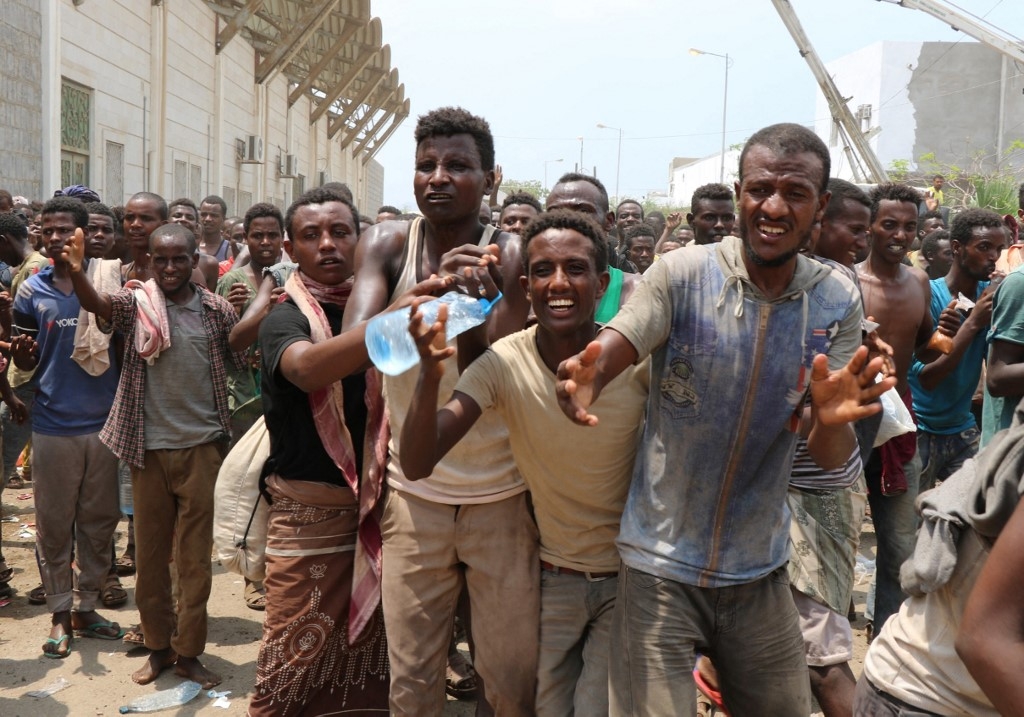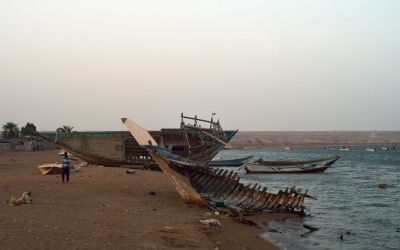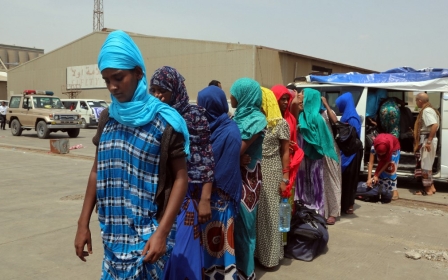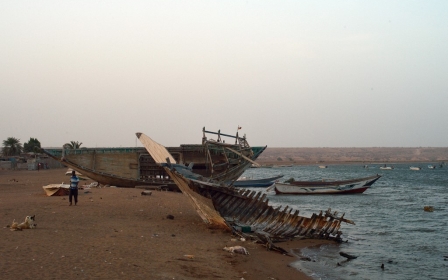Yemen: Evidence mounts that Houthis started Sanaa migrant centre fire

New details revealed by Human Rights Watch on Tuesday confirm grim testimony given to Middle East Eye that the Houthis started a fire that killed scores of migrants in Yemen.
Hours after the report was published, the United Nations called for an independent probe of the fire in Yemen's capital.
Migrants who spoke to HRW said their fellow detainees were "roasted alive" after members of the rebel group which controls the capital fired two projectiles into an overcrowded holding facility in Sanaa.
Videos analysed by HRW also confirm that some migrants could not escape after being overcome by smoke from the fire and that walls had to be broken down to let migrants escape the blaze.
"There was a lot of smoke and a lot of fire," a 20-year-old migrant told HRW.
"I don't have the words to express what it was like - [the projectiles] exploded, and there was so much smoke, and then there was a fire that spread.
"I was terrified, I felt like my mind was blocked with smoke. People were coughing, the mattress and blankets caught fire... people were roasted alive. I had to step on their bodies to escape."
The growing evidence debunks initial claims made by the Houthis and the United Nations that the fire had killed only eight people.
Last week, survivors of the fire told Middle East Eye that Houthi security guards fired unidentified projectiles into the overcrowded holding facility, which sparked the fire.
A two-minute clip given to MEE showed the charred remains of dozens of victims, most of whom are reportedly Ethiopian.
HRW also confirmed testimony given to MEE that the holding facility was dangerously overcrowded and housed hundreds of migrants, mainly Ethiopian, inside the detention centre.
Detainees told HRW the Houthis fired two projectiles after some detainees organised a hunger strike to protest the facility's conditions and continued detention.
They complained that guards would verbally abuse them and demand a payment of $280 to let them go from their indefinite detention.
On the day of the fire, detainees refused to eat breakfast, which led to a skirmish, and at about 1pm local time, they refused to eat lunch.
Security guards then identified the leaders who organised the hunger strike, took them outside, and then beat them with wooden sticks and firearms - leading to other migrant detainees to throw plates at the guards, injuring one in the face.
The Houthi officials then took the migrants to a nearby hangar. Several minutes later, security officials wearing Houthi uniforms returned and told the detainees to say their "final prayers" before launching the projectiles.
Fifteen minutes after the fire started, people outside the hangar helped break down the doors and walls to let survivors escape the fire, which had taken the lives of scores of migrants.
Plight of migrants in Yemen
Survivors of the fire were taken to government-run medical facilities, which prevented outsiders from entering.
Rights groups have urged the Houthis to give UN agencies access to medical facilities holding injured migrants as relatives fear the worst for their loved ones stuck in Yemen.
Siraj Mamo, who hails from the Ethiopian town of Dukem, has not heard from his nephew, Murad Kamal, for more than a week.
For the past three months, Murad lived in Sanaa as an undocumented worker. He had told his family that he would try to flee Sanaa as a crackdown on undocumented migrants intensified.
"We had been told Murad was rounded up," Mamo told MEE. "His phone no longer rings when we call it, and with news of the fire, the uncertainty is torturing his mother."
The fate of the migrants held in the Sanaa detention centre is a tragic reminder of the difficult conditions that led them there.
Houthi officials denied its forces had started the fire and called on the UN to help repatriate the detained migrants.
Thousands have used smugglers to cross the Red Sea from East Africa to find work in Saudi Arabia. Yemen is the only way for them to get to Saudi Arabia, with many also using the war-stricken country as a transit point to save up money before going into the oil-rich kingdom.
But when Covid-19 struck, Saudi Arabia closed its borders, leaving hundreds stranded in Yemen. Some took the perilous journey back to East Africa. Others had no choice but to stay in Sanaa, hoping for the Saudi border to open or to be repatriated.
Middle East Eye propose une couverture et une analyse indépendantes et incomparables du Moyen-Orient, de l’Afrique du Nord et d’autres régions du monde. Pour en savoir plus sur la reprise de ce contenu et les frais qui s’appliquent, veuillez remplir ce formulaire [en anglais]. Pour en savoir plus sur MEE, cliquez ici [en anglais].





